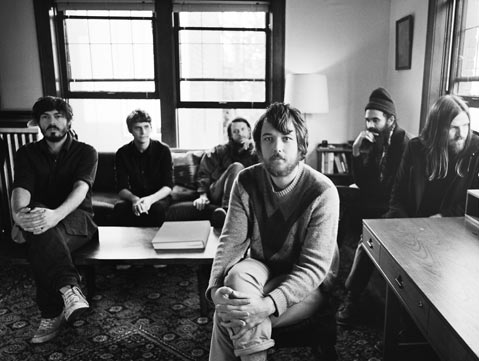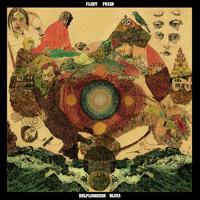
In the music video for “Grown Ocean,” the first single off of Fleet Foxes’ sophomore album, the band is shown recording, touring, and goofing off the way best buds do. It’s a day-in-the-life short film, not even five minutes long, and so rockumentary-esque it’s almost cliché. Yet the grainy, light-leaked shots stick with you, painting a picture of a band on the road and radiating a sense of warmth that so perfectly mimics Fleet Foxes’ now-signature sound.
Since forming in 2006, the Seattle-based six-piece has gone from indie buzz band to mainstream success story, thanks in large part to their harmony-filled self-titled debut. In the three years since, Fleet Foxes have gained a reputation for their stunning live shows and become the poster children for new-school hippiedom, all scruffy-faced and nature-loving. They’ve also proved themselves worthy of the hype. Helplessness Blues, this year’s follow-up to their 2008 release, is as rich and texture-filled as its predecessor, brimming with nods to ’60s and ’70s folk rock that give the whole thing a slightly vintage feel. Thematically, though, Blues is darker and focuses on “the struggle between who you are and who you want to be,” as frontman Robin Pecknold put it. This Tuesday, September 13, Fleet Foxes play the Santa Barbara Bowl with The Walkmen. I recently spoke with Pecknold via email about the new record, living in the public eye, and the future of America’s favorite folkies.

The last time we spoke, prior to your solo show with Joanna Newsom last July, you mentioned that the new record was taking longer than expected. What was the catalyst that ultimately brought Helplessness Blues to fruition? I think that mainly time/money running out and everybody’s patience being tried by the whole process were the main catalysts for completion! That was a strange process — I had very little confidence in what I was writing and was just sort of pawing in the dark looking for an album. It was an interesting process to go through in that way, and we definitely learned a lot for next time, but by the end of it, it was a real slog to the finish line, with me arbitrarily changing the goal posts. I remember calling [producer] Phil [Ek] the day after Christmas 2010 and asking him to come back into the studio to rerecord one bit of one vocal of a song that was already mixed. Sorry dude!
How did you decide when and where you would start working on this record? “When” was based on just having enough stuff to work on in one concentrated period of time, so that meant like the backbones for nine or so songs completed ahead of time — then we went in and recorded basic tracks in West Hurley, New York. “Where” was based on hearing about this studio, Dreamland, from our friends in Beach House, who had had a good experience recording there. But we also wanted to build our own little space to record in Seattle, which we did, so we had to take some time to set that up after the Dreamland sessions.
Coming off a debut as big as yours, I can’t help but assume that there is some pressure, spoken or unspoken, that goes into penning a sophomore release. Over the course of creating this album, have you gained a new perspective on the way the business creeps in to the creative process? I think so, for sure. It was interesting to be in a position where the decision to make or release music was dictated by a desire for time off from touring — just wanting a break from the road meant we weren’t working quite as fast as we would’ve if there weren’t touring commitments at the end of the recording process, which thinking back is a little bit weird. That would be an example of “the business” negatively affecting the actual creative output, in terms of expedience or whatever. But there is so much else that is rewarding about the way we have been allowed to make music [in] the last few years that it’s not much to complain about I guess.
How do you feel your relationship with music-making has changed over the last few years? I would imagine there would be some impact that comes with living under the media microscope. It hasn’t changed the way I think about making music at all, in terms of enjoying making music, listening to music, etc. I’m still way down for the cause. It’s definitely made me hyperaware of my “persona,” if there is such a thing, or who people think I am or whatever. I’ve had to think about myself more often since we’ve put out records then I ever really did before.
Sonically, Helplessness Blues feels less pastoral than the self-titled. Would you say location — whether it be where you were recording, or where you were writing — played a part in this? I’m still not really sure what pastoral means! I think this record was intended to be a little more grounded in reality, but that was probably not a symptom of the locations where recording or writing took place. Recording on the first album took place in very sterile environments; this one was either in beautiful upstate [New York] or this nice little studio building we built. So I’d say there was an inverse relationship between pastoral locations [and the] music.
Were there any records or artists that you recall being in regular rotation during the recording process? I can’t really remember! Lots of Nic Jones, Beach House, Roy Harper, Dungen, Joanna Newsom, West Coast Pop Art Experimental Band.
Were there any touchstone albums, production-wise, that you guys found yourselves looking to for inspiration? [Van Morrison’s] Astral Weeks in some ways, and Nic Jones’ Penguin Eggs for some of the guitar sounds.
For many, Fleet Foxes is synonymous with vocal harmonies and live, organic instrumentation. What draws you to music as a listener? I definitely have certain stylistic preferences, like a 1966 to ’71 habit I can’t shake. But that’s just taste, and I can enjoy almost any kind of song from any genre. I guess you look for some sort of core inside the music that appeals to you beyond just the stylistic trappings, a certain chord vocabulary or a certain drama in the melodies, or something.
Do you ever get writer’s block, and, if so, what helps to combat it? I get Acute Confidence Loss all the time but am usually able to make stuff, even if I throw it away. I usually just take a break and do other stuff. I don’t think writer’s block really hits you hard until later in life? I’m only 25. People in their twenties are dramatic. It’s writer’s speed bumps for most of us, I bet.
In your mind, what’s the highest compliment you can pay a musician/band/song/album? Listening to an album on endless loop seems to me a very high compliment. Hats off to you, Kurt Vile!
You guys wrap up your contract with Sub Pop relatively soon. Have you given any thought to what comes next for Fleet Foxes in that arena? I have no idea yet! We’re thinking about it now and really have no clue. I imagine it will not be the same thing it’s been, but that’s all I really know.
In one sentence or less, what do you hope for the future of Fleet Foxes? Invent the next Furby/Tickle Me Elmo/Beanie Babies?
4•1•1
Fleet Foxes play the Santa Barbara Bowl on Tuesday, September 13, at 7 p.m. with openers The Walkmen. Call 962-7411 or visit sbbowl.com for tickets and info.







